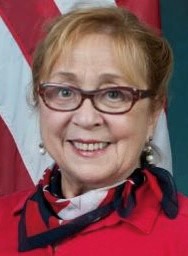
Colleagues, Happy Anniversary! Each anniversary is a time when we take stock of what brings us to today and where we are headed tomorrow. This week we celebrate the close collegial relationship between the American Evaluation Association (AEA) and the U.S. Government Accountability Office (GAO) throughout these 35 years. This week’s entries will address GAO’s efforts to solve those complex “wicked” socio-cultural problems that defy permanent solutions but demand our best efforts to solve them.
I am Valerie Caracelli, an inaugural member of AEA. I served on the Board of Directors and in various other roles for which I received the Robert Ingle Service Award in 2016. I currently serve on the Board of the Washington Evaluators for the New Professional and Student Coordinator initiatives. This year marks GAO’s 100th Anniversary. I entered federal service in 1989 and currently work as a Senior Social Science Analyst in the Center for Evaluation Methods and issues (CEMI), Applied Research and Methods (ARM) Team.
Rad Resources:
Oral histories featured in the American Journal of Evaluation (some highlighted in this blog entry) shine a light on the professional development of scholars whose works are foundational to our field.
A brief history of integrating evaluation into GAO’s audit culture can be found in Stephanie Shipman’s chapter in Crossover of Audit and Evaluation Practices, 2020. An organizational evaluation presence at GAO traces its roots back to the mid-1970s with the passage of the Congressional Budget and Impoundment Control Act of 1974, which strengthened GAO’s role in evaluation of federal programs. In 1980, the Institute for Program Evaluation was established, renamed the Program Evaluation and Methodology Division (PEMD) in 1983. Past AEA President Lee Sechrest referred to PEMD as the “jewel in the crown” of federal program evaluation.
Under Eleanor Chelimsky’s influential leadership, strong ties were formed with AEA. She served as President of AEA, as did two of her staff, David Cordray and Leslie Cooksy. Eleanor and Lois-ellin Datta, among others, guided evaluation practice through GAO reports, methodology transfer papers, and their own prolific theoretical contributions to evaluation literature. Over the years, GAO staff were honored with the Alva and Gunnar Myrdal Government Evaluation Award, among other AEA awards. Agency downsizing closed PEMD in 1996, providing an opportunity for some staff to strengthen evaluation expertise in GAO’s other program area units.
Other PEMD staff became the core of a smaller unit in ARM’s Center for Evaluation Methods and Issues, and advanced evaluation through reports, consultation, and externally facing capacity-building efforts. With the passage in 1993 of the Government Performance and Results Act (GPRA), Joe Wholey brought his expertise to CEMI and our Strategic Issues (SI) team. Through fruitful collaboration, testimony, and agency guidance, he assisted GAO and other agencies in meeting GPRA requirements and subsequently the GPRA Modernization Act of 2010 through the body of work on Managing for Results done in SI.
The external Federal Evaluators list-serv and website www.fedeval.net was initiated by Stephanie Shipman in 1999. Recently retired from GAO, she serves on AEA’s Evaluation Policy Task Force, which updated in 2019 its hallmark publication, An Evaluation Roadmap for a More Effective Government. Passage of the Evidence Act of 2018 renews the Center’s emphasis on building GAO and federal agency capacity to meet the evaluation challenges that will continue to bond AEA and GAO into the future.
Inaugural members of AEA will recall sending their dues to Nancy Kingsbury, Treasurer of the newly formed AEA, subsequently Managing Director of ARM, and recently retired after celebrating 50 years of government service. The ARM team today conducts its critically important work under the leadership of Managing Director Lawrance Evans, Jr.
Happy Anniversaries!
The American Evaluation Association is hosting GAO Week in celebration of the US Government Accountability Office’s 100th anniversary. The contributions all this week to aea365 come from authors who address GAO’s efforts to solve those complex “wicked” socio-cultural problems that defy permanent solutions but demand our best efforts to solve them. Do you have questions, concerns, kudos, or content to extend this aea365 contribution? Please add them in the comments section for this post on the aea365 webpage so that we may enrich our community of practice. Would you like to submit an aea365 Tip? Please send a note of interest to aea365@eval.org. aea365 is sponsored by the American Evaluation Association and provides a Tip-a-Day by and for evaluators. These views and opinions do not necessarily represent those of the American Evaluation Association, and/or any/all contributors to this site.
